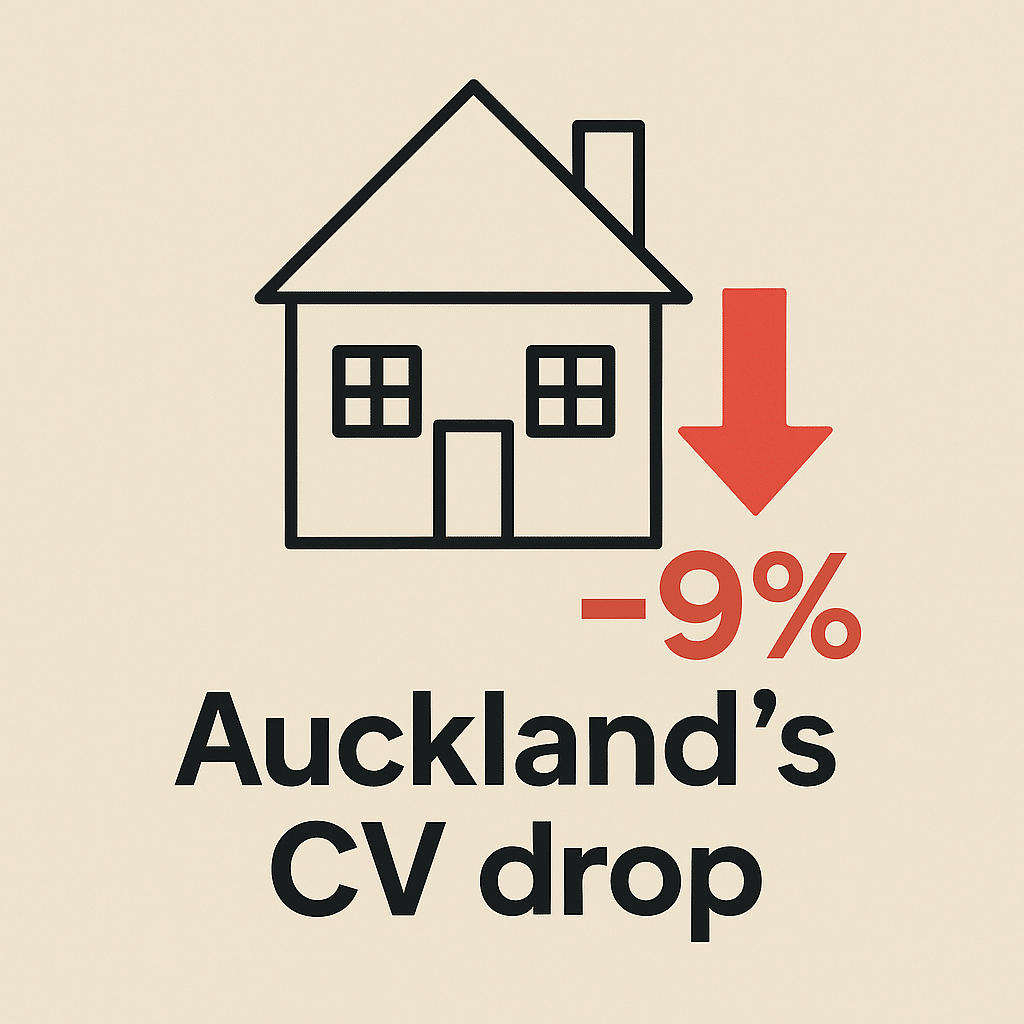What 630,000 Property Owners Need to Know
Auckland’s new CVs are finally here after a long wait, showing a 9% drop citywide. But it’s complicated. Some real estate agents believe tens of thousands of properties are still overvalued, while others might be undervalued.
What Happened?
After a lengthy wait, the council finally released new CVs earlier this month, showing residential values dropped by 9% since the last valuation in 2021. That’s a paper loss of about $128,000 on the average Auckland home.
But before you start fretting, remember that these valuations are based on property market trends as of 1 May 2024 – that’s over a year ago.
Here’s the Auckland Breakdown:
-
Inner city got hammered: Areas like Mt Albert, Mt Eden, Avondale, and Ponsonby saw drops of about 14%.
-
Outer suburbs held their ground: Rodney saw no change, while Great Barrier Island properties shot up 38%.
-
The winners: Point Wells (+7.9%), Omaha (+7.4%), and Huapai (+6.9%)
-
The casualties: Newmarket (-8.8%), Whitford (-8.4%), and Auckland Central (-7.3%)
Agents Call BS on Valuations
Some real estate agents are calling BS on the new valuations, claiming “tens of thousands of Auckland properties have been hit with potentially misleading CVs.”
One complaint is that property valuations were carried out before Watercare introduced its 10-year restrictions on new build sites. So, if you were banking on development potential, your CV might be hundreds of thousands of dollars too high.
Case in point: a property in Ōtara had its CV fall $20,000 to $880,000, but because water constraints weren’t factored in, the actual market value is closer to $770,000. That’s a $110,000 reality check.
Areas getting hit hardest by this disconnect include:
-
Beach Haven
-
Ōtara
-
Papatoetoe
-
Warkworth
What New CVs Mean for Your Rates Bill
The good news? If your residential property value dropped more than the average 9%, you can expect a smaller rates increase than the 5.8% average. The bad news? You’re still getting a rates increase.
For 2025/2026, the annual rates for an average residential property (CV $1.29 million) will be $4,069. That’s about $223 more per year, or around $4.30 per week.
Do CVs Actually Matter?
Auckland Council keeps insisting that “rating valuations allow rates to be fairly shared” and “do not accurately reflect a property’s current market value.” But anyone who’s tried to sell a house knows that’s not how the real world works: CVs influence the sale price of a property.
Why? Because:
-
Buyers use CVs as a psychological anchor
-
Online valuation tools factor in CVs
-
Many sellers don’t engage proper agents and rely on these numbers
Here’s a thought: It will be difficult in the next six to nine months to score a sale price over CV without any justification.
What Investors Should Do Now
-
Check your numbers: Don’t just glance at your CV and move on. Compare it to recent sales in your area, see what similar properties are actually selling for, and consider whether your property has development potential affected by water restrictions.
-
Consider objecting (but be strategic): You have six weeks to object, and once you file, a valuer will assess your property – the CV could go up, down, or stay the same. It’s worth objecting if your property is in a water-constrained area, recent comparable sales are significantly lower, or your property details are incorrect.
-
Adjust your expectations: If you’re selling, don’t expect to get 2021 CV prices. Most properties in South Auckland are selling below their 2021 CVs, so the new CVs might actually be closer to reality. If you’re buying, this could be your moment. Lower CVs might make some sellers more realistic about pricing.
The Bigger Picture
Remember, Auckland’s average property value fell 4% between June 2021 and the valuation date, and it’s continued moving since then. Between May last year and now, Auckland’s average property value fell another 1.1% to $1.299 million.
But here’s the thing about property cycles — if we zoom way out, the trend goes up, up, and up. Unless you’re forced to sell tomorrow, the best strategy might be to do absolutely nothing.
The Auckland property market has been through worse. Remember 2008? Yeah, we all survived that, too.
Want to dive deeper into the objection process or need help analysing your property’s true market value? Call 0800 GOODWINS to make an appointment with one of our experts.

